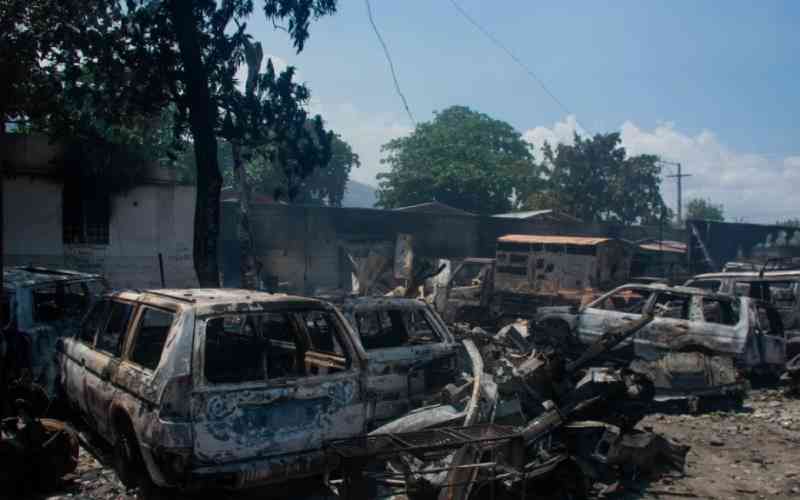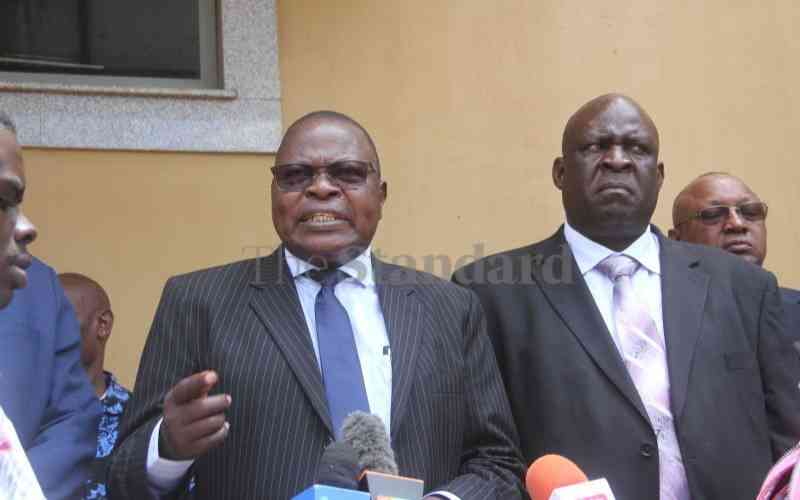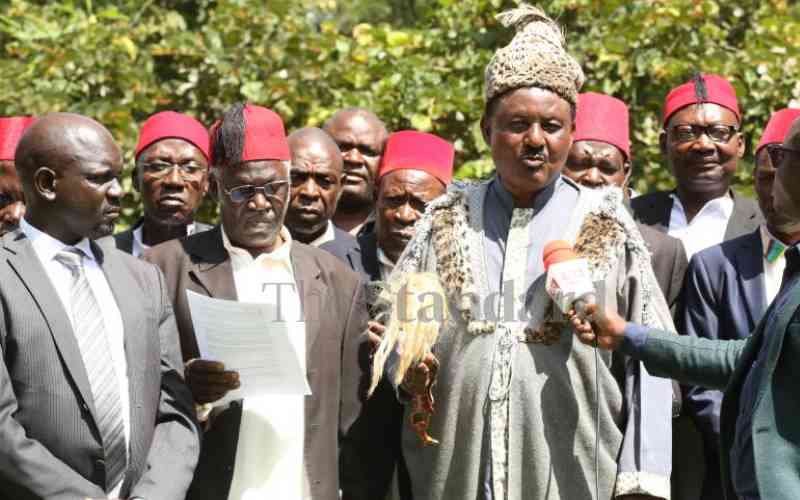By GEOFFREY MOSOKU
Nairobi, Kenya: Questions are now being raised as to who authorised a letter to the UN Security Council seeking to terminate ongoing criminal cases against President Uhuru Kenyatta and his deputy William Ruto.
This is after Ruto and Attorney General Githu Muigai disowned a letter by Kenya’s ambassador to the UN Kamau Macharia last Friday requesting the Security Council to ask the ICC to terminate proceedings against President Uhuru, Ruto and former Kass FM presenter Joshua arap Sang, on grounds that the cases were a threat to Kenya’s national security and undermined the country’s sovereignty.
“The official position of the Kenyan government is that it has cooperated fully with the ICC and intends to continue cooperating within the framework of the Rome Statute and International law,” AG Muiga said on Saturday.
The AG statement followed Ruto’s swift reaction to the letter, with his lead counsel at ICC Karim Khan retorting: “His Excellency the Deputy President would like to dissociate himself with the application by Ambassador Macharia Kamau as it does not represent his desire. He was never consulted in the making of the application and not in the presentation.”
On Sunday, the Office of the President was silent on the genesis of the letter even with these two high profile rebuttals as experts pointed a finger at the President’s office as being responsible for that letter.
Kitutu Chache South MP Richard Onyonka, who is Kenya’s immediate former Foreign Affairs assistant minister, says that Ambassador Macharia may have received instructions from the Office of the President (OP).
“Ambassador Kamau Macharia is a senior and highly respected member of the country’s diplomatic chore could not have written this letter without the prompting of someone higher up in government. Someone somewhere in OP must have given him that statement,” Onyonka says.
According to the MP, who also sits in the National Assembly Defence and Foreign Relations Committee, the matter of ICC should be handled with a lot of caution as it’s a weighty matter, where the country cannot afford to expose itself to any diplomatic embarrassment.
“The matter of ICC must be handled by the President and Deputy President cautiously because it’s a weighty matter where you cannot afford to gaffe,” he says.
The MP says that Kenya must now write to the ICC to explain its thorough position on the matter after petition the UN on the same.
According to University of Nairobi political science don, Adams Oloo, an envoy to a foreign country is a personal representative of the head of state and thus whatever he/she does is perceived as the true position of the President.
“An ambassador is a personal representative of Head of State and whatever he does is on behalf of him. The Deputy President can disown such statement because the envoy is not his personal representative,” he says.
Dr Oloo argues that the president can only disown the ambassador by firing him for misrepresentation and since he has not done that, it can only be interpreted that whatever the contents of the letter to the UN were, then it is the president’s personal position. .
The don further says it’s possible that AG Githu Muigai may have not been consulted as an advisor to the government but that does not mean the president can have a position on a certain matter.
Stay informed. Subscribe to our newsletter
However, Dr Oloo counterpart from USIU professor Munene Macharia, argues that the position of any envoy is independent with its holder making independent decisions.
He however says Ambassador Macharia may have been relying on instructions of the former regime of Kibaki which had vigorously put a spirited fight to end the ICC cases through the UN intervention.
“The ambassador in New York tends to be independent in making decisions. He appears to have been relying on the policy adopted by the previous regime because it is possible he has not been given fresh instructions on the matter,” he says.
Prof Munene adds that Deputy President and the AG are distancing themselves from the statement because it is not the policy of the new government, is an indication that Ambassador Macharia may have been using instruction of the former regime arguing that Kenya is not the first country to witness conflicting statements ion a certain issue internationally.
“Kenya is not the first country to find itself in such a situation, it happened recently when Washington gave two contradicting statements by Obama and Carson shortly before the Kenya election,” he argues.
However, former PNU strategist Prof Peter Kagwanja says that Ambassador Kamau actions can be attributed to the vacuum in the ministry of foreign affairs.
“It is attributed to a vacuum at the foreign ministry where we do not have a minister yet, we also don’t have a principal secretary to issue proper instructions. Ordinarily the ministry of foreign affairs is the one that communicates the president’s policy to the ambassadors,” Prof Kagwanja adds.
 The Standard Group Plc is a
multi-media organization with investments in media platforms spanning newspaper
print operations, television, radio broadcasting, digital and online services. The
Standard Group is recognized as a leading multi-media house in Kenya with a key
influence in matters of national and international interest.
The Standard Group Plc is a
multi-media organization with investments in media platforms spanning newspaper
print operations, television, radio broadcasting, digital and online services. The
Standard Group is recognized as a leading multi-media house in Kenya with a key
influence in matters of national and international interest.
 The Standard Group Plc is a
multi-media organization with investments in media platforms spanning newspaper
print operations, television, radio broadcasting, digital and online services. The
Standard Group is recognized as a leading multi-media house in Kenya with a key
influence in matters of national and international interest.
The Standard Group Plc is a
multi-media organization with investments in media platforms spanning newspaper
print operations, television, radio broadcasting, digital and online services. The
Standard Group is recognized as a leading multi-media house in Kenya with a key
influence in matters of national and international interest.








